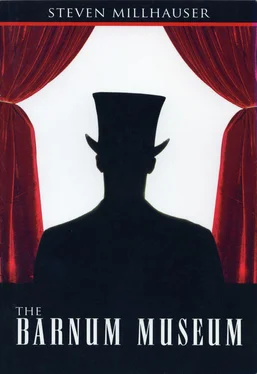A sound of shattered glass.The Professor has counted seven tiers of crisscrossing passages, but he is no longer certain of the number because many of the passages dip and climb, attaching themselves to higher and lower tiers without the evidence of steps. The multiplying passages cannot be endless, the Professor reminds himself: that is a delusion born of anxiety. Evidently the builder, or series of builders, desired an impression of extravagance, of freedom, as if a single SECRET PASSAGE moving from one known locus to the next were a form of intolerable constriction, for attempts have been made to disguise or blur the intermingling of passages and create confusion in the unwary wanderer. Passages scrupulously resembling other passages have been introduced, so that the illusion of having returned to familiar ground is continually created, only to be disrupted by a deliberate change in the pattern; passages containing shelves, furniture, and paintings lead suddenly to primitive passages where large rocks lie on the earthen paths and water trickles along the stony walls. It occurs to the Professor that perhaps he has been ceaselessly retracing a small number of cunning passages. Or it may be that he has been following a slowly widening and deepening series of passages, a series that he has far from exhausted, a series that has barely begun. His legs are growing tired, and despite the cool air he is perspiring. He stops for a moment to wipe his eyeglasses, which slip from his fingers to the hard path. He hears a sound of shattered glass. He crouches and pats the ground; grains of moist dirt cling to his fingertips. When he picks up his eyeglasses, he brings them close to his eyes and sees that the lenses are unbroken. He stands up quickly. I am imagining things, he says aloud. You are talking to yourself, he says aloud. His voice is very clear. He puts on his eyeglasses and begins walking briskly. This is not happening, he says aloud. Ahead of him, the path divides in two.
Is it possible?In the mauve dusk Miss Scarlet sits in the corner of the window seat smoothing her crimson dress, black in the twilight, over her knees. The Colonel has escaped through the door. Already the late episode is fading, becoming implausible. Is it likely that she? Is it possible that they? The Colonel, after all, has never seen her. He experiences women solely as a series of banal erotic images; he transforms real flesh into figments of his imagination. The Colonel is a magician: in that dark, unseeing gaze, women vanish. Miss Scarlet cannot have been present at the unlikely scene at the window seat, because the Colonel’s lovemaking is strictly solitary. The thought is somehow bracing. In the violet gloom Miss Scarlet pinches herself on the forearm and gives a little gasp of pain. She looks up suddenly. “Mr. Green?” she asks, straining her eyes. But Mr. Green is no longer there.
Jacob raises his glass.Jacob rolls a three: two short of the DINING ROOM. The game is almost over. He raises his wineglass and says, “Happy birthday, Davey.” David looks down, flushing with pleasure. Marian places a hand on his hand. “Hey. Happy birthday.” David looks up to see her smiling at him; her tired, sorrowful eyes brim with tenderness. Susan pushes back her chair and stands up. She steps around the table, bends over suddenly, and kisses David on the cheekbone. “Happy birthday, David,” she says. He can smell the clean scent of her blouse, mixed with a tang of something else: skin? hair? The kiss was a little high, just under his eye. He hears her sit down. David looks quickly at Susan, at Jacob, at Marian. His sister’s hand is warm on his hand, his cheekbone still feels the pressure of Susan’s lips, his brother’s greeting sings in his ears. He would like to tell them that they can count on him, that he will take care of them, that everything will be all right: Jacob will be famous, Marian will be happy, Susan will marry Jacob, Dad will never die. He knows that the words are extravagant and says them only to himself. “Thank you,” David says. For a moment, it’s as if everything is going to be all right.
In the attic.It is late, on a summer night. In the Ross attic, light from a streetlamp passes through a window-screen, makes its way past the spinning, misty blades of an exhaust fan, and falls dimly on a narrow stretch of floor flanked by old bookcases filled with childhood toys. One shelf holds an uneven pile of abandoned board games (Sorry, Parcheesi, Pollyanna, Camelot), a puzzle showing on the cover a three-masted ship with billowing sails plunging in black-green waves, a pile of Schaum music books with colored covers and miscellaneous sheet music such as “The Flight of the Bumblebee,” “My Old Kentucky Home,” “ O Mein Papa ,” “In the Hall of the Mountain King,” and “Old Black Joe,” and a shoebox with crushed sides that contains wooden red and black checkers pieces embossed with crowns, a notched Viewmaster reel called “Ali Baba and the Forty Thieves,” tin play-money coins, a wooden slice of watermelon the size of a section of orange, a three-lobed puzzle piece showing rich blue sky, an edge of red roof, and a corner of yellow chimney, a small flip-book featuring a mouse who picks up a sledgehammer and cracks open a gigantic egg from which emerges a frowning chicken with a bump on its head that grows longer and longer, a green rubber grasshopper, a blue fifty-dollar Monopoly bill, and Professor Plum. Beyond the bookcases, in the dark part of the attic, Marian’s old German school, a gift from her mother’s mother, Rebecca Altgeld, lies under the slanting front wheel of a fallen bicycle. The teacher sits tilted at her desk with raised arms, the six pupils lean in different directions on three wooden benches. Deeper in the blackness, old wooden barrels stand among cardboard cartons and dress boxes. On the floor Pierrot sits with his head against a barrel, his blouse torn, his face stricken with sadness, dreaming of Columbine beside a trellis in moonlight.
Finale.It is late, and in the mansion a tiredness comes over things. The books in the LIBRARY bookcases have lost their depth, and in their flatness can no longer be removed. The billiard balls and the billiard table form one unbroken surface, smooth as paper to the stroking thumb. In the KITCHEN cupboard a mouse knocks over a fragile upright plate, which begins to fall slowly, as if through water, and dissolves in shadow. Miss Scarlet, alone on the window seat in the melancholy BALLROOM, feels a stiffening in her limbs: she is slowly turning to wood. Colonel Mustard will stop, his arm held out toward Mrs. White, who, already beginning to lean toward the consoling hand, will pause on the threshold of a momentous decision. Mrs. Peacock will enter the DINING ROOM and freeze in an attitude of disdain, Mr. Green will remain with one foot raised in a shadowy corridor, Professor Plum is already fading among his fading passageways.
On Saturday afternoons in summer my father took me to the movies. All morning long I waited for him to come down from his study, frowning at the bowl of his pipe and slapping the stairs with his slipper-moccasins, as though the glossy dark bowl, the slippers, the waiting itself were a necessary part of my long-drawn-out passage into the realm of dark. I savored every stage: the hot summer sunshine outside the ticket booth, the indoor sunlight of the entranceway with its glass-covered Coming Attractions and its velvet rope, the artificial glow of the red lobby, the mysterious dusk of the theater, the swift decisive darkening — and between the blue folds of the curtain, slowly parting, the sudden shining of the screen. Gravely my father had explained to me that the people on the screen were motionless photographs, passing quickly before my eyes. It was like my black-and-white flip-book from the candy store: a smiling mouse leaped from a diving board toward the water as a frowning shark rose up, opening its jaws wider and wider. And when you did it the other way, see! — the sinking jaws close, the upside-down mouse rises through the air and lands on his feet on the high board. My father was never wrong, but I felt he was trying to shield me from darker knowledge. The beings behind the curtain had nothing to do with childish flip-books or the long strips of gray negatives hanging in the kitchen from silver clips. They led their exalted lives beyond mine, in some other realm entirely, shining, desirable, impenetrable.
Читать дальше












